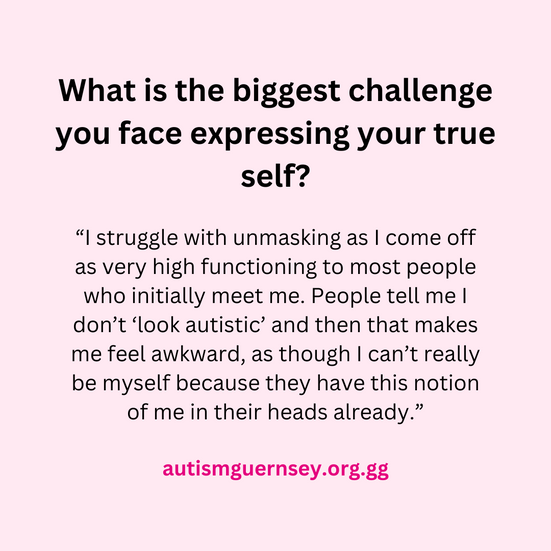Your Autistic Identity: Responses from the Autism Guernsey Community Survey
- martine.ellis
- Aug 21, 2024
- 4 min read

Towards the end of June 2024, we created a questionnaire to explore how autistic adults in the Autism Guernsey community felt about the concept of identity. Thanks to everyone who took the time to respond.
In this article, we will attempt to summarise the responses we received to specific questions. We will also share some quotes to illustrate how complex the concept of identity is to autistic people and how eloquently many of our community members expressed themselves. We plan to share more quotes and insights from the survey in a different format soon.
We draw no conclusions from this survey other than identity is complicated and deeply personal. Each response reflects a unique lived experience, offering a glimpse into the varied ways autistic people understand and define who they are.
What does the concept of “identity” mean to you?
For the respondents, identity is deeply personal and varied. Some see it as the core of who they are – their personality, values, and how they see themselves. Others describe it as a mix of traits, experiences, and labels that make them unique. Many mentioned the challenge of defining themselves, especially in relation to how others see them. Overall, identity is both something inherent and something shaped by life and interests.
“To me, the concept of “identity” encompasses both where you fit within the community and the wider world, and how you stand out as an individual. It is about who you are, what is important to you, and the unique aspects of your personality, style, and thinking that define you. Identity captures the essence of you as a unique individual.”
“Identity means your tribe. Who you are is like an onion with many layers; your brain, your upbringing, beliefs and values.”
To what extent do you know your identity, and how does autism contribute?
Many respondents have a varied understanding of their identity, with autism playing a significant role. Some have a clear sense of self, where autism is central to how they perceive the world. Others describe a journey of self-discovery, where their diagnosis helped clarify or reshape their identity. For some, understanding their identity is ongoing, complicated by masking and societal expectations. Overall, autism contributes in different ways – sometimes as a lens through which they see the world, other times as a challenge in fully grasping who they are.
“I’ve come to accept my place in society now that I’m a bit older and have received a diagnosis of ASD. For me, it’s about not feeling under pressure to conform with expectations and knowing that that’s ok. Until now I’d tried different jobs, struggled socially, and suffered with stress, anxiety and depression. Now that I’m aware of my autism and understand myself better, I can make adaptations, and I don’t feel under pressure to fit into society in the same way other people can.”
“Autism is like my operating system.”
“I know myself well to an extent, but never considered I might be autistic until pointed in that direction then diagnosed in my late 40s. I now realise that gives the general context for why I've always found people hard to understand, and has made parts of school and working life much harder than they should be. Why can I sometimes score 100% on exams, yet some people with different skill mixes, sometimes lower in some areas, often cope massively better? I am now on a journey to better self-understanding, including strengths, weaknesses, and to developing my sense of self and engagement with life in that context. I am comfortable as a family person, but still feel like a part actor in some other areas of life. I want to explore being and developing my authentic self more, although social survival will probably always necessitate some learning to understand and cater to expected norms as far as possible; in the details of presentation, but remaining at the same time honest, fair and true to my values.”
What is the biggest challenge you face expressing your true self?
The biggest challenge many respondents face in expressing their true selves is fear of judgement and rejection. Social anxiety, masking, and the pressure to conform to societal norms are common themes. Many struggle with self-doubt, particularly in environments where they feel their true selves might not be accepted or understood. Some also mention the difficulty in balancing authenticity with the need to fit in, especially when dealing with misconceptions or lack of empathy from others.
“I struggle with unmasking as I come off as very high functioning to most people who initially meet me. People tell me I don’t “look autistic” and then that makes me feel awkward, as though I can’t really be myself because they have this notion of me in their heads already.”
“I have had lots of issues with my friendships because of misunderstandings caused by my autism, and this has caused me to have lots of issues with people pleasing and keeping appropriate boundaries. I have experienced a lot of different types of bullying and negativity from lots of people in my life, and I often feel too heavily burdened to be myself. After long periods of depression, I sometimes feel like I don't even know what ‘myself’ is. I find that this, mixed with the types of perfect people I am inspired by on social media, really makes me struggle to be my true self authentically. I am always trying to people please and compare myself to others, and whilst this is something I am actively trying to improve, I am learning more and more that I don't yet truly know myself. However, I try to remind myself each day that myself is good enough, and I am learning gradually more and more about who I am.”
“The biggest challenge for me is unwritten social expectations. We live in a world where there’s the expectation to socialise and interact with people every day… at school, at work, in shops etc. The only person I can truly be myself with, is me.”








Comments